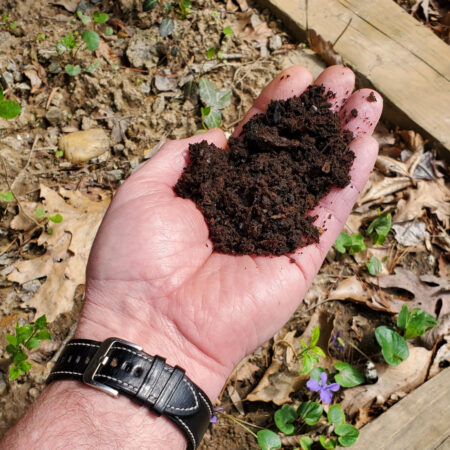Understanding the Color of Hot Compost: Brown vs. Black and the Role of Maturation
SOIL HEALTH :
It's not uncommon to find the results of hot composting to be a brown color. Here's why.
"Never plant without a bucket of compost at your side". - Elsa Bakalar
Share this post

Hot Composting Mysteries- Hidden Potential
The Brown Color in Hot Compost
When you engage in hot composting, where temperatures rise to facilitate rapid decomposition, it's not uncommon to find that the resulting compost has a brown color rather than the deep black hue often associated with compost. This color variation is attributed to several factors:
• Carbon-Rich Materials: Hot composting relies on a mix of carbon-rich (brown) and nitrogen-rich (green) materials. If the compost pile contains a higher proportion of carbon-rich materials, such as sawdust, leaves, wood chips and straw, it can contribute to the brown color of the finished compost.
• Incomplete Decomposition: The rapid breakdown of materials in hot composting might result in compost that hasn't fully matured. As materials continue to decompose and age, they tend to darken, eventually transitioning from brown to black.
• Moisture Levels: Proper moisture is crucial for efficient composting. If the compost pile becomes too wet or too dry, it can slow down decomposition and lead to compost that appears brown.
• Oxygen Availability: Hot composting requires adequate aeration for the microbial activity responsible for decomposition. Poor oxygen circulation can affect the efficiency of the process and contribute to a brownish color.
• Balancing Carbon and Nitrogen: Achieving the right balance between carbon and nitrogen is key to successful composting. An excess of carbon-rich materials can delay the nitrogen-rich breakdown that contributes to the black color.
Achieving Black Compost
While brown compost is still valuable and can offer benefits to your garden, achieving black compost often indicates that the compost has fully matured and is rich in nutrients. To encourage the development of black compost:
• Balance Carbon and Nitrogen: Ensure that your compost pile has a proper balance of carbon-rich and nitrogen-rich materials. Mixing in more nitrogen-rich materials, such as kitchen scraps or grass clippings, can help accelerate the decomposition process and lead to a darker color.
• Turn and Aerate: Regularly turning the compost pile promotes aeration, essential for effective decomposition. Adequate oxygen levels facilitate the breakdown of materials and contribute to a darker compost.
• Maintain Moisture: Keep the compost pile moist but not overly wet. Proper moisture levels support microbial activity and accelerate the decomposition process. If you have a moisture meter, aim for between 7% and 9% moisture.
• Allow Maturation: Sometimes, all that's needed for compost to turn black is time. Allow your compost pile to mature for an extended period, turning it periodically, until it reaches the desired color and consistency.
Usability of Brown Compost
Brown compost, despite its color, is still a valuable addition to your garden. While it may not have fully matured, it contains organic matter, beneficial microorganisms, and nutrients. You can incorporate brown compost into your garden beds as a soil amendment. Over time, as it continues to break down and mature in the soil, it will contribute to improved soil structure and fertility. Brown compost works well in garden soil when added throughout the year. Don’t wait till Spring to add brown compost to your garden. By mixing brown compost into the soil during the Fall and Winter months, you are giving it time to mature.
Conclusion
The color variation between brown and black compost in hot composting is a natural outcome of various factors, including material balance, moisture, and aeration. While black compost is often the desired end product, brown compost remains valuable and can be used in the garden to improve soil health. Achieving black compost requires attention to factors such as material balance, turning, and maturation time.
The Incuposter™ by Aira Corp serves as a prime example of a hot composter that addresses these factors to produce high-quality compost by providing temperature regulation, moisture control and aeration. Ultimately, whether your compost is brown or black, the benefits it provides to your garden and the environment are immeasurable.
